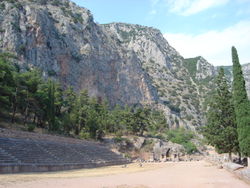
Other Panhellenic Games
Pythian Games
From Wikipedia, the free encyclopedia
View of the stadium of the Delphi sanctuary, used for the Pythian Games. The stone steps on the left were added under the Romans.
The Pythian Games were one of the four Panhellenic Games of Ancient Greece, a forerunner of the modern Olympic Games, held every four years at the sanctuary of Apollo at Delphi.
They were held in honour of Apollo two years after (and two years before) each Olympic Games, and between each Nemean and Isthmian Games. They were founded sometime in the 6th century BC, and, unlike the Olympic Games, also featured competitions for music and poetry.
 This starting line at the Delphi stadium used
for the Pythian Games at Delphi, Greece has a design
representative of that of many ancient Greek stadiums: stones
with two lines in which the athletes nudged their toes, and round
holes in which posts could be erected to support the start
signalling mechanism.
This starting line at the Delphi stadium used
for the Pythian Games at Delphi, Greece has a design
representative of that of many ancient Greek stadiums: stones
with two lines in which the athletes nudged their toes, and round
holes in which posts could be erected to support the start
signalling mechanism.
The music and poetry competitions pre-dated the athletic portion of the games, and were said to have been started by Apollo after he killed Python and set up the oracle at Delphi. Otherwise, the athletic events were the same as the Olympic Games. A four-horse chariot race was held in a hippodrome in the plain, not far from the sea, in the place where the original stadium was. (ref: Pindar)
The winners received a wreath of bay laurels from the city of Tempe in Thessaly.
The Pythian Games included a chariot race.
Panhellenic Games
Panhellenic Games is the collective term for four separate sports festivals held in ancient Greece.
The four Games were:
Olympic Games - the most important and prestigious of the Games,
held every four years near Elis, in honour of Zeus;
Pythian Games - held every four years, near Delphi, in honour of
Apollo;
Nemean Games - held every two years, near Nemea, also in honour
of Zeus;
Isthmian Games - held every two years, near Corinth, in honour of
Poseidon.
The Games took place in a four-year cycle known as the Olympiad, which was one of the ways the Greeks measured time. The Olympic Games were used as a starting point, year one of the cycle; the Nemean and Isthmian Games were both held (in different months) in year two, followed by the Pythian Games in year three, and then the Nemean and Isthmian Games again in year four. The cycle then repeated itself with the Olympic Games. They were structured this way so that individual athletes could participate in all of the games.
Participants could come from all over the Greek world, including the various Greek colonies from Asia Minor to Spain. However, participants probably had to be fairly wealthy in order to pay for training, transportation, lodging, and other expenses. Neither women nor non-Greeks were allowed to participate, except for very occasional exceptions such as Nero.
The main events at each of the games were chariot racing, wrestling, boxing, pankration, stadion and various other foot races, and the pentathlon (made up of wrestling, stadion, long jump, javelin throw, and discus throw). Except for the chariot race, all the events were performed in the nude.
The written history of the Olympic Games dates to 776 BC, but their actual founding was centuries earlier. The other three games were founded in the 6th century BC.
The computer game Zeus: Master of Olympus features the four games as sporting events. The player must build certain atheletic, drama, or philosophical structures to participate in the various games.
